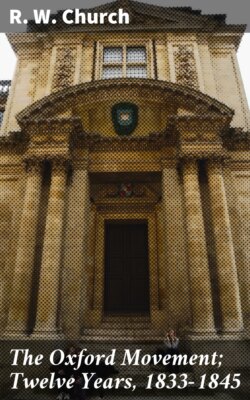Читать книгу The Oxford Movement; Twelve Years, 1833-1845 - R. W. Church - Страница 8
На сайте Литреса книга снята с продажи.
FOOTNOTES:
Оглавление[2] The suppression of the Irish bishoprics. Palmer, Narrative (1883), pp. 44, 101. Maurice, Life, i. 180.
[3] "The Church, as it now stands, no human power can save" (Arnold to Tyler, June 1832. Life, i. 326). "Nothing, as it seems to me, can save the Church but an union with the Dissenters; now they are leagued with the antichristian party, and no merely internal reforms will satisfy them" (Arnold to Whately, January 1833, i. 348). He afterwards thought this exaggerated (Life, i. 336). "The Church has been for one hundred years without any government, and in such a stormy season it will not go on much longer without a rudder" (Whately to Bp. Copleston, July 1832. Life, i, 167). "If such an arrangement of the Executive Government is completed, it will be a difficult, but great and glorious feat for your Lordship's ministry to preserve the establishment from utter overthrow" (Whately to Lord Grey, May 1832. Life, i. 156). It is remarkable that Dean Stanley should have been satisfied with ascribing to the movement an "origin entirely political" and should have seen a proof of this "thoroughly political origin" in Newman's observing the date of Mr. Keble's sermon "National Apostasy" as the birthday of the movement, Edin. Rev. April 1880, pp. 309, 310.
[4] Readers of Wordsworth will remember the account of Mr. R. Walker (Notes to the "River Duddon").
[5] Compare Life of Whately (ed. 1866), i. 52, 68.
[6] Arnold to W. Smith, Life, i. 356–358; ii. 32.
[7] Life, i. 225 sqq.
[8] "I am vexed to find how much hopeless bigotry lingers in minds, οἶς ἥκιστα ἕχρη" (Arnold to Whately, Sept. 1832. Life, i. 331; ii. 3–7).
[9] St. Bartholomew's Day
[10] "The mere barren orthodoxy which, from all that I can hear, is characteristic of Oxford." Maurice in 1829 (Life, i. 103). In 1832 he speaks of his "high endeavours to rouse Oxford from its lethargy having so signally failed" (i. 143).
[11] Abbey and Overton, English Church in the Eighteenth Century, ii. 180, 204.
[12] V. Maurice, Life, i. 108–111; Trench's Letters; Carlyle's Sterling.
[13] "In what concerns the Established Church, the House of Commons seems to feel no other principle than that of vulgar policy. The old High Church race is worn out." Alex. Knox (June 1816), i. 54.
